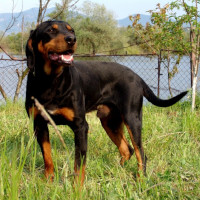 |
Bulgarian Scenthound |
|
He is not recognized by the F.C.I. |
Origin |
Bulgaria | |
Translation |
Francis Vandersteen |
| Bulgaria has two indigenous dog breeds used for hunting. These are the Bulgarian Hound (also known as the Bulgarian Barak) and the Bulgarian Scenthound (also known as the Gonche). Despite a confusingly similar name, these two breeds have distinctive aspects. While the Barak has a curly coat, the Scenthound is covered with a sheen reminiscent of the Rottweiler or Dobermann around it. The Scenthound is a medium to large dog with a keen sense of smell. It has an enviable reputation for being cooler and less aggressive than the Rottweiler, to which its appearance is sometimes compared. The Scenthound is one of Bulgaria's most popular native breeds, but little known outside the country. Its alternative name, Gonche, is an affectionate term meaning "tracker", reflecting both its use as a hunting dog and the warmth it engenders in its owner. The Bulgarian Scenthound is an ancient breed established in the Balkans many centuries ago. However, as is often the case with these older breeds, their precise origins are lost in the mists of time. One theory is that the first Gonche dogs belonged to the ancient Thracians, around 1,500 years ago. These dogs, along with those brought by the Turks from Asia, were bred together in the Balkan region to create the dog known today as the Bulgarian Scenthound. This is corroborated by specialists who suggest that all Scenthound breeds found in this region originated in Asia. Whatever the truth about this breed's beginnings in life, dogs have certainly had an impact. Remains of artwork and pottery show similar-looking dogs used for hunting by the Celts, Thracians, Illyrians and ancient Greeks. If the "when" was 1,500 years ago, the "where" was the Balkan peninsula and the "why" as a hunting dog. Their instinct to track and hunt is so deeply rooted that it gave rise to their other affectionate name, Gonche, meaning tracker or pursuer. Indeed, these early working dogs had to earn the title of "Bulgarian Scenthound" by passing a test. This involved locating a live hare and bringing it back to the hunter. The dog had to do this not once, but three times, successfully, to become a full-fledged tracker. Popular in its native Bulgaria, the Gonche is little known worldwide. Think of a hunting dog and you'd be forgiven for imagining the impressive, long-eared heaviness of a Bloodhound or Basset Hound, or the stocky robustness of a Beagle. However, the Bulgarian Scenthound breaks this mold in that it is all long-legged elegance. Indeed, the Bulgarian Gonche has an appearance closer to the fine lines of a greyhound or podenco, rather than a more robust breed. It has a reasonably shaped head with a good length of muzzle so it can run without catching its breath. This deep chest reflects the need for a large lung capacity to allow this speed, while chasing a hare. Considered a medium-sized dog, the Bulgarian Scenthound has a good length of leg to better cover the ground. And, although it has an elegant silhouette, it has a hint of sturdiness, as befits a dog that can track for hours over rough terrain. Then there's Scenthound's short, smooth Bulgarian coat. This is where the mention of the Rottweiler comes in, because of the coat coloring. The Gonche is a striking black and beige dog, with a black body, light brown muzzle and points that bear an uncanny resemblance to a Rottie. But that's where the similarities end, because a well-socialized Gonche is a honey, more likely to lick than bite. The Bulgarian Gonche is first and foremost a hunting dog, which testifies to its love of scent. He loves to work and will become firmly attached to his master. Indeed, professional hunters who work with Gonches often train them to individual commands so that they respond to one and only one person. The breed has a good temperament and, when properly socialized as a puppy, gets on well with strangers and other dogs. However, like all dogs, this depends on the youngster, who is exposed to a wide variety of sights, sounds and experiences from an early age. This helps to build confidence and reduce anxiety, making a well-adjusted adult dog. Gonche's good nature means he can make a good family dog as long as his physical activity needs are met. However, once trained to hunt, this animal becomes a poor pet due to the high number of prey. When considering a Gonche as a family companion, it's best to start with a puppy, then raise it at home. |






 English (United Kingdom)
English (United Kingdom)